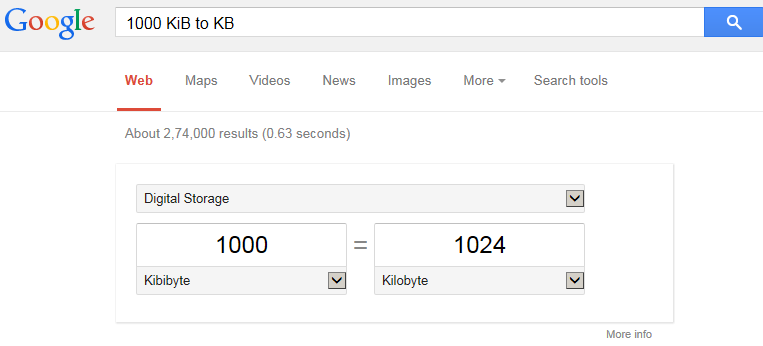Why k should be used for 1000 and Ki for 1024.
A reviewer we will call "User's Buys Tests" has analyzed external storage drives.
All along their test, they mention that all drives have some "60 GB of reserved, user unavailable space" (1), exact values listed in a per drive table so that the readers can make the best buy.
It turns out that the alleged difference is in fact 1.024^3×disk size. That's because those Testers do not know the difference between GiB with which the partitions are measured and GB with which the disk size is measured. They have carved that stupidity for everyone to see in a stone called PDF.
The KiB has been introduced not because of a whim but because some quantities are measured that way and others the kB way, and that it's not convenient to speak of "multiple of 1000 kilometers per hour" and "multiple of 1024 kilobytes". For another example, communication rates (what many erroneously call speed) are measured in kbps = 1000 bps (bits/sec) while one speaks of kBps = 1024 Bps (bytes/sec) where it should be KiBps. One does not multiply KiBps by just 8 to obtain kbps.
The reason why some persons did not notice that communication rates kbps are multiple of 1000 instead of 1024 is that they use k for 1024 in computer science which generally counts by powers of 2.
So, the KiB is not a matter of pedantry or anything, just of knowing exactly what one speaks about.
And I'm surprised to see little mention of that duality in this discussion.
The fact is indeed that one usually deals with KiB and that, although it dispenses me to speak of "units of 1024 bytes", it seems a burden to add that "i" to what is used the most for the sake of what is used the least. But how could a disk formating program display its numbers without making the GB/GiB distinction? The annoying thing in the disk size confusion is that those drive manufacturers who are accused of overestimating drive sizes are those who are correctly using the international unit multiplier Giga in GB and that it's the other ones who are to blame for not using GiB. It's in fact much easier than switching to the metric system!
What I notice is that using the GB/GiB distinction make writing about them much easier already.
(1) not even wondering what that space could be used for; in fact, drive manufacturers are so scrupulous about disk sizes (in GB or in 1000000000 byte units if you prefer longer phrases) that the spare sectors used to hold the data of failing regular sectors are in surplus of the exact byte count.

